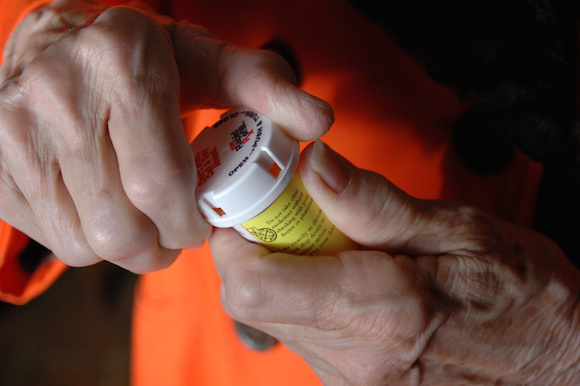
A new study published last week shows that benzodiazepines are linked to an increased Alzheimer’s disease risk. A useful synopsis was published on the Harvard Health Publications blog.
A team of researchers from France and Canada linked benzodiazepine use to an increased risk of being diagnosed with Alzheimer’s disease. In the study, the greater a person’s cumulative dose of benzodiazepines, the higher his or her risk of Alzheimer’s.
The type of drug taken also mattered. People who were on a long-acting benzodiazepine like diazepam (Valium) and flurazepam (Dalmane) were at greater risk than those on a short-acting one like triazolam (Halcion), lorazepam (Ativan), alprazolam (Xanax), and temazepam (Restoril).
You can read the full British Medical Journal study here.
The possible increased risk of Alzheimer’s disease is just part of the picture. There are a host of other very serious issues with this medication.
Jeremy C. Fox wrote a great article in the Boston Globe called “When withdrawal is the hardest part.” It covers Alison Page’s struggle with recovering from difficulties associated with benzodiazepine withdrawal.
… Alison ” was experiencing withdrawal between doses of Ativan, a drug often prescribed for anxiety or insomnia. After taking a dose that night” Alison “felt fine — for the moment. But her struggle to recover continues more than two years later.
While rampant abuse of heroin and prescription opiates dominates public attention, dependency on benzodiazepines — a group of tranquilizers that includes drugs such as Ativan, Klonopin, and Xanax — remains less widely acknowledged or understood.
Doctors say benzodiazepines are effective for short-term stress, as in the days following the death of a loved one or another emotionally difficult event. But problems can arise when use continues for more than a few weeks.”
I don’t feel any benzodiazepine prescriptions should be written. There are much better ways to deal with anxiety – like addressing possible low GABA and tryptophan; addressing low zinc levels; addressing the gut and possible dysbiosis; quitting sugar and caffeine; figuring out if gluten is an issue; eating to control blood sugar; and eating quality food that includes grass-fed red meat, wild fish, healthy fats and organic produce.
Alison “was prescribed Ativan by a psychiatrist in 2009, she said, as she adjusted to working as a receptionist after graduating from Northeastern University. As a shy person, she found the front-and-center role a tough fit, she said.”
Many of my shy and introverted clients have pyroluria, a social anxiety condition. Addressing this with zinc, vitamin B6 and evening primrose oil solves the problem. Instead many people are prescribed benzos rather casually and end up like Alison, having to deal with all these horrible withdrawal effects from the benzos: increased anxiety, dizziness, terrible fears, less able to deal with stress, prone to getting sick and not sleeping for months.
Alison joined the BenzoBuddies.org support group and it was through this group that she learned what was happening to her. This is a great group that supports folks who are tapering off benzos.
I was fortunate to have interviewed Dr. Catherine Pittman on the Anxiety Summit in June – Benzodiazapines: Risks vs Benefits – and she shared the results of a survey she did with members of BenzoBuddies.org.
Here are a few facts and gems from our interview:
- The United States has the highest rate of benzodiazepine prescription in the world
- If the person is prescribed a benzodiazepine, short-term relief is obtained, but tolerance develops, and increasing dosages may be required
- Physiological dependence on the benzodiazepines can occur within, four to six weeks [I am hearing it can be much shorter than four to six weeks]
- If you have people who are on benzodiazepines, you may have to give them lists, because they may not remember as much as person who’s not on benzodiazepines [this relates directly to the new research mentioned above and cognitive decline]
- Not all physicians or psychiatrists have the knowledge to help a person successfully withdraw.
- Professor Malcolm Lader, who is from the Royal Maudsley Hospital (in the UK) stated: “It’s more difficult to withdraw people from benzodiazepines than it is from heroin.”
- And one of the things that we heard from the BenzoBuddies community, “Please educate the treatment professional community. Please help them know. My doctor didn’t understand this. My psychiatrist didn’t understand what was going on. Try to do what you can to educate them.”
My goal with this blog post is to help with what the BenzoBuddies community is asking – educating the treatment professional community and you as well. If you’re not currently taking a prescription for benzodiazapines please think twice before doing so and please share this information with friends and family who may be considering getting on them.
I also encourage you to read the comments in the Benzodiazapines: Risks vs Benefits blog. Many Benzobuddies.org members shared very heartfelt stories of their battles with benzo withdrawal. We appreciate them (and Alison) for being so open and vulnerable about what has happened to them. They are doing this to raise awareness.
If you do have a benzodiazepine prescription please don’t stop cold turkey and without first talking to your doctor, as well as learning about the taper protocols. www.Benzo.org.uk is a great resource for Professor Ashton’s taper protocols and other valuable benzo information. And do check out BenzoBuddies.org for a great support system.
Based on all the above side-effects and withdrawal symptoms and whether or not the above new study shows a causal link between benzodiazapines and Alzheimer’s disease, I would not recommend these drugs for anyone ever!